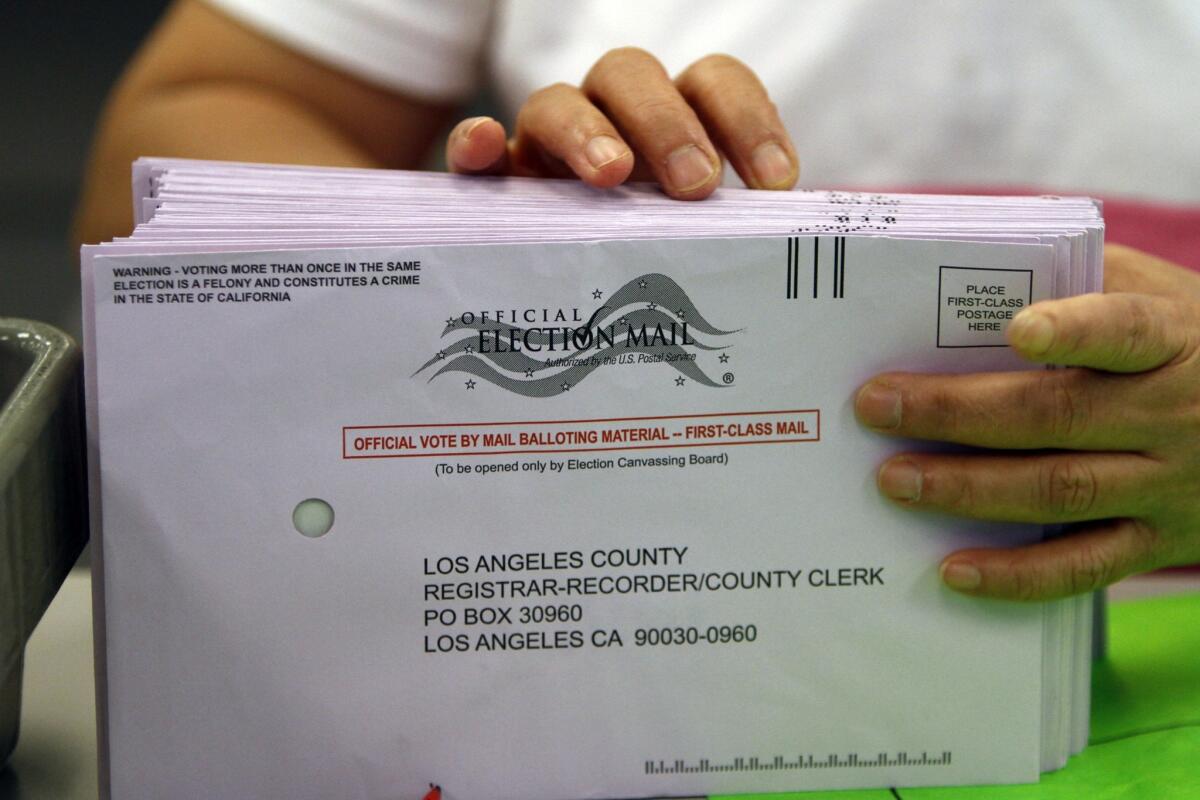Column: Trump doesn’t like mail-in voting, but it’s not his call

- Share via
WASHINGTON — A confession: I voted by mail last week. And it didn’t feel dirty at all.
Like every voter, I had been warned against the practice by President Trump.
“Mail-in ballots are very dangerous,” he said last week. “There’s tremendous fraud involved and tremendous illegality.”
Death is hitting the country unevenly, and Trump is counting on a polarized and fragmented response to prevent the toll from sinking his presidency.
“You get thousands and thousands of people sitting in somebody’s living room, signing ballots all over the place,” he explained in April.
Busted! In our case, though, it was only three of us, not thousands. My wife, our daughter and I sat around a table, puzzled over the choices for Circuit Court and Board of Education, and shared a pen to sign the envelopes.
In our defense, we didn’t have much choice. In Maryland, where I live, our governor, a moderate Republican named Larry Hogan, decided that in-person voting would be too dangerous in a pandemic. Hogan closed most polling places and ordered counties to send mail-in ballots to every registered voter.
It seemed like a sensible precaution. But Trump objected so strongly that he threatened to block federal funding from Michigan and Nevada if they follow the same course. Both states have Democratic governors; oddly, he didn’t target any Republicans.
There’s no real evidence to support the president’s frequent charge that mail-in ballots leads to fraud.
The only large-scale vote fraud in recent years happened in North Carolina in 2018, but the problem wasn’t mail-in ballots. It was “ballot harvesting,” which allows campaign workers to collect ballots door-to-door. The culprit was a Republican.
Every so often, though, the president mentions a political objection too.
Mail-in voting “doesn’t work out well for Republicans,” he tweeted last month.
He said a Democratic proposal to require mail ballots nationwide would produce “levels of voting that, if you ever agreed to it, you’d never have a Republican elected in this country again.”
Many Republican political strategists think Trump is right on that count — that if voting is made easier, more Democrats will participate.
“There’s long been a fear that measures like automatic voter registration and vote by mail will help Democrats turn out more poor people and more black people,” a longtime Republican strategist told me. (He demanded anonymity to speak frankly.) “There’s a part of the GOP that is quite comfortable with voter suppression.”
Republican political consultant John Brabender was more diplomatic. He said he believes mail-in voting will help Democrats because their voters turn out less consistently, especially in cities.
But he worries that Trump is hurting his own party by denouncing mail voting so fiercely. In states that allow mail voting, GOP leaders have been urging the party faithful to participate — only to be denounced by Trump supporters as turncoats.
“If we spend all our time criticizing vote by mail, the results could become self-fulfilling,” he warned.
Ironically, voting by mail in its old-fashioned version, the absentee ballot, has traditionally been a Republican specialty.
GOP leaders in California, Arizona, Florida and other states have long urged their supporters, especially older voters, to vote by mail. Trump used an absentee ballot to vote in Florida’s primary this year.
Republican National Committee Chair Ronna Romney McDaniel says she still favors absentee voting — just not universal ballot distribution.
“We are really against … the ballots being sent directly to people who may or may not want them,” she explained.
In other words, voting by mail is fine — just as long as it isn’t too easy.
But those nakedly political debates date from before the coronavirus made polling places hazardous to your health.
What are states to do this fall, when we could be contending with a second wave of the pandemic? Can safety trump gamesmanship?
Maybe. In many states, even Republican governors are heeding the call for easy access to mail ballots, no matter what Trump says.
Ohio, South Carolina and West Virginia have all expanded absentee voting. Even Florida, where Trump votes, has maintained relatively permissive rules.
The real challenge is likely to be funding. Mail-in elections will be costly for states and counties — not only from postage, but because they will need more people and machines to count millions of paper ballots.
It will be “a tsunami,” predicted Richard L. Hasen, an election law expert at UC Irvine. “These ballots are going to come whether the resources are there or not. And if the resources are not there, it increases the chances of a sloppy count and litigation, especially if the election result is close.”
It may take days or weeks to count the ballots — a problem familiar to Californians, but not to the rest of the nation.
House Democrats have passed a pandemic relief bill that includes $3.6 billion in election funding, but Senate Majority Leader Mitch McConnell (R-Ky.) has said he intends to block the measure.
Governors and state election officials are already forming bipartisan coalitions to try to wrangle new funding from Congress.
Running a clean election by mail shouldn’t be hard. All it requires is funding, organization and vigilance against fraud. But the president and his campaign seem bent on making it harder than it needs to be.
If the result is close, Trump will charge fraud. He did that even after he won in 2016.
Maybe it’s projection; maybe the president really believes everyone’s a cheater. Maybe it’s just noise to keep his supporters fired up. Maybe he’s laying the groundwork to contest the result if he loses.
Whatever the case, he’s not only undermining the legitimacy of the November election, he’s doing it in the midst of the worst pandemic in a century. No wonder so many Republicans disagree with him for once.
More to Read
Get the L.A. Times Politics newsletter
Deeply reported insights into legislation, politics and policy from Sacramento, Washington and beyond. In your inbox three times per week.
You may occasionally receive promotional content from the Los Angeles Times.












